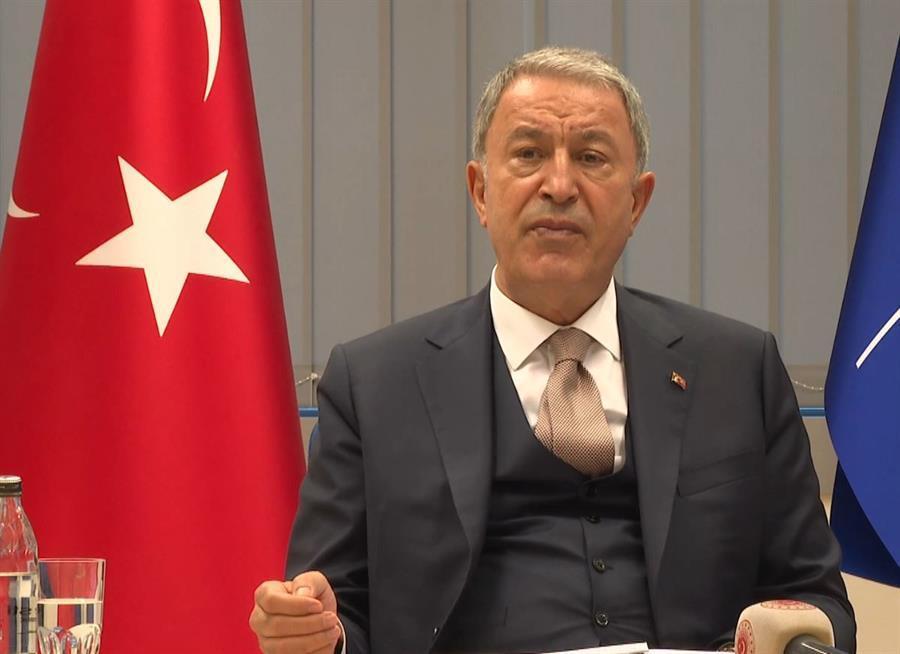Status quo in Black Sea is of vital importance: Defense minister
BRUSSELS

Maintaining the status quo in the Black Sea provided by the Montreux Convention is of vital importance, Turkey’s defense minister has said, calling on Ukraine and Russia to de-escalate tension and resolve problems through dialogue.
“There is balance, stability and security in the Black Sea thanks to this status quo. We have explained and continue to explain on every occasion that this is of vital importance,” Defense Minister Hulusi Akar told journalists in Brussels following two-day long NATO ministerial meetings on Feb. 18.
The defense ministers met amid an ongoing tension between the West and Russia over the latter’s extensive military deployment on Ukraine’s borders, causing concerns that an imminent Russian invasion against its neighbor could happen, just like it did in Crimea in 2014.
“There is a concern in us, in other relevant countries and in NATO countries. We follow developments closely with this concern. It is our common wish to maintain diplomacy and dialogue and reach a solution in this way,” Akar said, adding that the territorial integrity of Ukraine and Georgia is important for Turkey.
Turkey has always expressed its opposition against the Russian invasion of Crimea and its support to Ukraine’s territorial integrity, the minister said.
“We are in favor of solving the tension in the region with a balanced approach and in common sense, and in this sense, it is our sincere wish that the countries bordering the Black Sea can live in peace, dialogue, tranquility and prosperity,” he added.
According to the 1936-dated Montreux Convention, merchant vessels enjoy freedom of passage through the Turkish Straits, the Dardanelles and Bosphorus, while the passages of vessels of war are subject to some restrictions which vary depending on whether these vessels belong to Black Sea riparian states or not.
Thanks to the convention, balance in the Black Sea could have been secured between the Soviet Republic and NATO during the Cold War and Russia and the West after the collapse of the Soviet regime. Russian military operations against Georgia in 2008 and Ukraine’s Crimea in 2014, as well as NATO’s admission on Bulgaria and Romania, have disrupted this balance.
Realistic meeting with Greek minister
Akar informed that he held bilateral meetings with a number of his colleagues on the sidelines of the NATO meeting, including NATO Secretary-General Jens Stoltenberg and the defense ministers of the United Kingdom, United States, Bulgaria, Italia, Spain, Netherlands, North Macedonia, Romania, Latvia, Estonia, Netherlands and Greece.
“We have conducted a very positive, constructive meeting with Greek Defense Minister Mr. Nikolaos Panagiotopoulos. It was very spontaneous but also a very realistic one.”
He said he repeated his invitation for the fourth-round meeting of the two countries’ military officials, stressing, “We have differences, yes but we tell them ‘Let’s meet and discuss them’. Our objective is that the two parties benefit from the richness of the region within peace and stability and in line with international law.”
A fair share of the resources of the Aegean and Mediterranean is Turkey’s principal, Akar said, criticizing the Greek side for continuing provocative actions and rhetoric, indirectly referring to the armament of the islands that need to be kept demilitarized according to the Lausanne and Paris treaties.
“We have international and bilateral agreements about this. You cannot ignore the Lausanne Treaty and Paris Treaty. You will implement the articles that work for you and won’t implement the others. There is no such thing,” he said.
Greek efforts to turn its bilateral problems with Turkey into a Turkey-NATO or Turkey-EU conflict is a very big mistake, Akar said, criticizing some EU and NATO countries for pursuing a one-sided policy when it comes to disagreements between Ankara and Athens.
He also slammed Greece for pushing back irregular migrants at the expense of causing their death in the Aegean or in the Thrace region, saying “This must be stopped.”
Recalling that some 19 migrants froze to death after being pushed back by Greece earlier this month, Akar asked, “Where are those human rights defenders in the EU? These people have lost their lives in the center of Europe.”
















